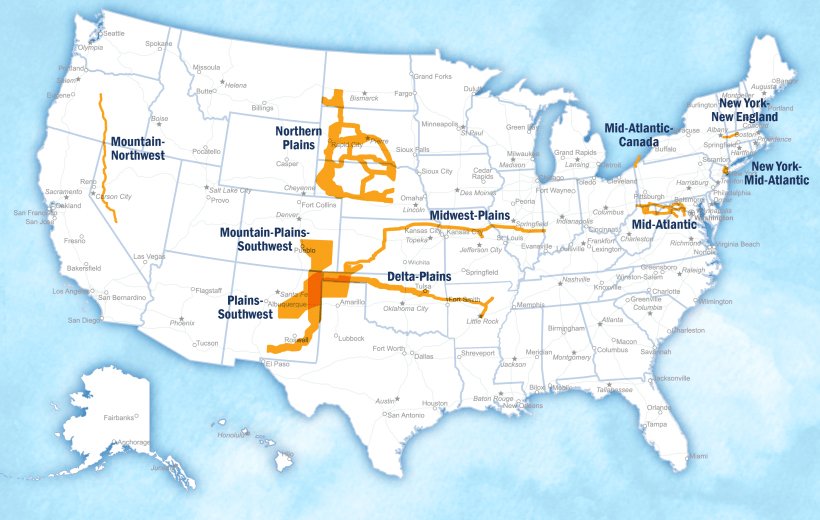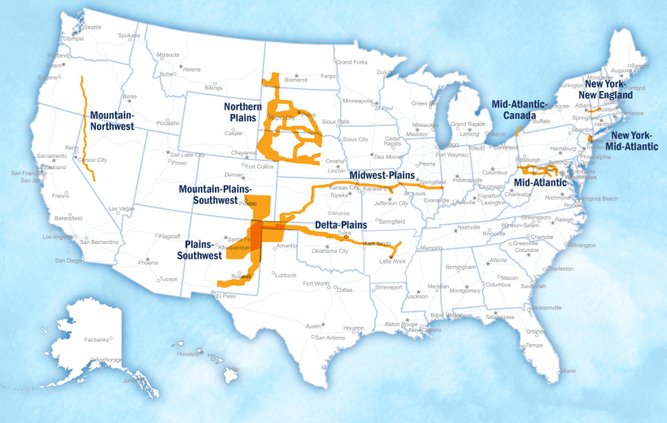WASHINGTON, D.C. — A proposed federal project aimed at providing funding for future electric transmission lines across the state of Kansas has been dropped, the Department of Energy announced by email Friday.
The Midwest Plains National Interest Electric Transmission Corridor (NIETC), one of 10 electronic pathways announced last February by the DOE affecting grid transmissions across the country, on Monday was reduced to three in an announcement by the DOE.
The Midwest Plains Corridor, designed as a five-mile wide, 780 mile long tract for future electronic development, was one of seven such pathways removed, the DOE announced. As proposed, the corridor would have stretched from its origin in Ford County diagonally across Kansas and the states of Missouri and Illinois, with a terminus at the Indiana border. In Kansas, the Corridor would have impacted landowners in 14 counties, including the Golden Belt area counties of Pawnee, Barton and Russell.
While its initial announcement as a preliminary DOE project received little notice until late spring at the close of a 45-day DOE comment period, landowners along the route fearful of the prospect of eminent domain began meeting with their county commissioners along the project route. A meeting hosted by Pawnee County Commissioners which drew more than 500 residents to the Larned Community Center on Aug. 15 was also attended by members of Sen. Roger Marshall’s office. A similar meeting was scheduled for Aug. 20 at the Great Bend Events Center, hosted by the Barton County Commissioners, that was also attended by Russell County officials and residents. An October joint meeting hosted by commissioners of Pawnee, Barton and Russell Counties resulted in the creation of a joint resolution protesting the corridor proposal. While the meetings were attended by members of Sen. Marshall’s staff, the senator was not personally present.
Elected officials weigh in
In his Monday announcement of the removal of the Midwest Plains Corridor from consideration by the DOE, Sen. Marshall noted that his office “took Kansans’ feedback and amplified their concerns directly to the DOE.
“Kansans living in the path of this proposed transmission line corridor spoke loud and clear: they do not want the federal government dictating what happens in their backyard,” Sen. Marshall said. “Kansans should always determine what is built in Kansas, not federal bureaucrats. This proposal represented a dangerous overreach of federal authority, turning our backyards into pathways for delivering energy to the coastal elites. As soon as we heard of this project, we immediately went to the DOE and fought back; we are glad to report that we won this battle, and Kansan’s voices were heard at the highest levels.”
Barton County Commission chairman Barb Esfeld was quick to praise the efforts of all local officials and residents involved. “It just goes to show that any time we pull together, work together for the same common good that we can’t go wrong,” she said Monday morning.
The DOE also emailed it was dropping the Delta Plains NIETC Corridor, a 645-mile transmission path running from Oklahoma to Arkansas, Oklahoma legislators reported Friday.
The Grain Belt Express
Meanwhile, plans for Invenergy’s $7 billion Grain Belt Express transmission line, which utilizes the same route through Kansas, continue.
In an announcement Nov. 26, GBE noted it had agreed to a conditional commitment for a loan guarantee loan from the DOE’s Loan Programs Office, of up to $4.9 billion in principal and interest to construct Phase 1 of a two-phase project through the state, running from Ford County to Callaway County, Mo. In a September release GBE noted that its “primary objective in seeking NIETC designation is to unlock federal financing options that can help us maintain competitive energy rates for consumers.”
Intended to connect three regional grids, the line’s route impacts roughly the same 14 counties in Kansas. Earlier, GBE noted it favored a reduction of the 5-mile corridor width to a half-mile either side of the transmission line footprint. GBE reported in October that it had received 97% of its required landowner easement commitments for construction in the state.





